Announcements
Internship Opportunities in WISCOMP
 WISCOMP (Women in Security Conflict Management and Peace) is offering internship opportunities. The internship will last between 10 to 16 weeks. Applicants should possess an undergraduate degree and should have a strong interest in one or more of the following fields: Security Studies, International Relations, Peacebuilding, Conflict Transformation, Gender Studies, and Education for Peace. Interested persons should submit their resume, a brief statement of their objectives for the internship and a sample of written work to WISCOMP. WISCOMP (Women in Security Conflict Management and Peace) is offering internship opportunities. The internship will last between 10 to 16 weeks. Applicants should possess an undergraduate degree and should have a strong interest in one or more of the following fields: Security Studies, International Relations, Peacebuilding, Conflict Transformation, Gender Studies, and Education for Peace. Interested persons should submit their resume, a brief statement of their objectives for the internship and a sample of written work to WISCOMP.
Click here for more information.
University of Queensland PhD Priority Top-up Scholarships Scheme 2013
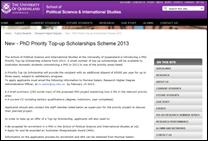 The School of Political Science and International Studies at the University of Queensland is introducing a PhD Priority Top-Up Scholarship scheme from 2013. A small number of top-up scholarships will be available to Australian domestic students commencing a PhD in 2013 in the following priority areas: Crisis Management Politics and Policy, Security and Environmental Change, Gender and Sexual Based Violence in Conflict, Non-Western Conflict Resolution, and Visual Politics: The Role of Images in Politics and International Relations. The School of Political Science and International Studies at the University of Queensland is introducing a PhD Priority Top-Up Scholarship scheme from 2013. A small number of top-up scholarships will be available to Australian domestic students commencing a PhD in 2013 in the following priority areas: Crisis Management Politics and Policy, Security and Environmental Change, Gender and Sexual Based Violence in Conflict, Non-Western Conflict Resolution, and Visual Politics: The Role of Images in Politics and International Relations.
To apply, applicants must email a brief summary of the PhD project and curriculum vitae to Muriwai Salam, Research Higher Degree Administrative Officer, at m.salam@uq.edu.au by 14 February 2013.
Click here for more information.
^ To the top
Recent Events
RSIS Seminar cum Book Launch on ‘Sustainable Development and the Nexus between Energy Security and Climate Change’
30 November 2012
RSIS Centre for Non-Traditional Security (NTS) Studies
Singapore
 Seminar speaker, Dr Hans Günter Brauch (Fellow at the Institute on Environment and Human Security of the United Nations University, Adjunct Professor (Privatdozent) at the Free University of Berlin; Editor, SpringerBriefs series on Environment, Security, Development and Peace [ESDP]), will be discussing the topic of 'Business-as-Usual vs. Sustainability Transition in the Context of the Nexus between Climate Change and Energy Security’. The seminar will be followed by a launch of two books titled Energy and Non-Traditional Security (NTS) in Asia, and Rethinking Energy Security in Asia: A Non-traditional View of Human Security. Edited by Mely Caballero-Anthony (Head of the Centre for NTS Studies), Youngho Chang and Nur Azha Putra, these books represent the perspectives of scholars from across Asia, looking at diverse aspects of energy security through a non-traditional security lens. The issues covered include environmental and socioeconomic impacts, the role of the market, the role of civil society, energy sustainability and policy trends in the ASEAN region. Seminar speaker, Dr Hans Günter Brauch (Fellow at the Institute on Environment and Human Security of the United Nations University, Adjunct Professor (Privatdozent) at the Free University of Berlin; Editor, SpringerBriefs series on Environment, Security, Development and Peace [ESDP]), will be discussing the topic of 'Business-as-Usual vs. Sustainability Transition in the Context of the Nexus between Climate Change and Energy Security’. The seminar will be followed by a launch of two books titled Energy and Non-Traditional Security (NTS) in Asia, and Rethinking Energy Security in Asia: A Non-traditional View of Human Security. Edited by Mely Caballero-Anthony (Head of the Centre for NTS Studies), Youngho Chang and Nur Azha Putra, these books represent the perspectives of scholars from across Asia, looking at diverse aspects of energy security through a non-traditional security lens. The issues covered include environmental and socioeconomic impacts, the role of the market, the role of civil society, energy sustainability and policy trends in the ASEAN region.
Click here for more information on the seminar.
3rd Dialogue on ‘Democracy and ASEAN Integration’
27 November 2012
Institute for Strategic and Development Studies (ISDS), Philippines
Manila
 The 3rd Dialogue on Democracy and ASEAN Integration (DODAI) on ‘Democracy and Governance in ASEAN: Experiences, Challenges and Prospects’ organised by ISDS, Philippines, sought to find common ground with regard to ‘democracy’, and to identify measures ASEAN can adopt to realise ‘democracy’ in the ASEAN Political-Security Community (APSC). DODAI attempted to address the following issues: The 3rd Dialogue on Democracy and ASEAN Integration (DODAI) on ‘Democracy and Governance in ASEAN: Experiences, Challenges and Prospects’ organised by ISDS, Philippines, sought to find common ground with regard to ‘democracy’, and to identify measures ASEAN can adopt to realise ‘democracy’ in the ASEAN Political-Security Community (APSC). DODAI attempted to address the following issues:
- The nature and characteristics of the governance structure related to each democratic element, as well as its brief background;
- The current approach/approaches employed to carry out the functions and roles of each governance structure;
- The current state of governance structure concerned, including problems and challenges faced both by governments and their citizens, if any;
- Perceptions, opinions and suggestions with regard to the current state of governance, and how this might be beneficial or detrimental to democracy both inside the country and within the region.
ASEAN-ISIS Colloquium on Human Rights
26 November 2012
Institute for Strategic and Development Studies (ISDS), Philippines
Manila
 The ASEAN-ISIS Colloquium on Human Rights (AICOHR) is an annual forum organised for participants from both government and non-government institutions. For the past 18 years, the forum has continually served as a venue for discussions regarding different human rights issues in the Southeast Asian region. The ASEAN-ISIS Colloquium on Human Rights (AICOHR) is an annual forum organised for participants from both government and non-government institutions. For the past 18 years, the forum has continually served as a venue for discussions regarding different human rights issues in the Southeast Asian region.
Organised by ISDS, Philippines, for the ASEAN Institutes of Strategic and International Studies (ASEAN ISIS), the 19th ASEAN ISIS Colloquium on Human Rights (AICOHR) was held at the Crowne Plaza Manila Galleria on 26 November 2012. This year’s theme was ‘Towards a People-Centered ASEAN: Enhancing Cooperation between and among ASEAN Human Rights Institutions and Mechanisms’. The 19th AICOHR assessed the performance of ASEAN human rights institutions and mechanisms and sought to propose relevant solutions to existing challenges. It also supported the realisation of an ASEAN Community that is not only people-centred but also located in an environment characterised by respect for the rule of law, human rights and democracy.
RCSS Participates in Strategic Forum on Water and Energy Security in South Asia
6–9 November 2012
Regional Centre for Strategic Studies (RCSS)
Bangkok
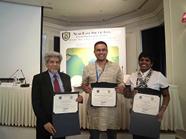 |
| From left to right: Amb. Nihal Rodrigo, Mr Chaminda Hettiarachchi and Dr Mallika Joseph |
RCSS participated in a Strategic Forum on ‘The Challenges of Water and Energy Security in South Asia and the Indian Ocean Region’, organised by the Near East South Asia (NESA) Center for Strategic Studies at Legua State Tower Hotel in Bangkok, Thailand on 6–9 November 2012. Forty participants took part in the forum including alumni, senior military officers, government officials, academics and think tank scholars, to exchange ideas and opinions, and to generate policy-relevant recommendations.
The topics discussed include the security threats presented in South Asia by growing water insecurity in the Himalayan/Hindu Kush watershed; collective approaches to adaptation to and mitigation of these threats; the interaction of water and energy security; and cooperation between the countries of the Persian Gulf and South Asia to enhance energy security.
Dr Mallika Joseph, Mr Chaminda Hettiarachchi and Amb. Nihal Rodrigo, RCSS Executive Director, Associate Director and Member of the Board of Directors respectively, participated in the event.
Seminar on ‘The International Politics of Disease Reporting: A Story of H5N1 Reporting in Asia’
5 November 2012
RSIS Centre for Non-Traditional Security (NTS) Studies
Singapore
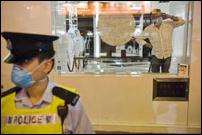 In this seminar, Dr Sara Davies, Senior Research Fellow, Griffith Asia Institute, Griffith University; and Program Convenor, Prevention of Mass Atrocities Workstream, Asia Pacific Centre for the Responsibility to Protect (APR2P), explored the question of whether there exists an evolving ‘duty to report’ among states in the event of novel infectious disease outbreaks. Her presentation examined competing accounts of the degree to which states appreciate this new obligation through examining reporting behaviour during the H5N1 human infectious outbreaks in East Asia. Specifically, it looked at reporting behaviour for H5N1 human infectious cases in Cambodia, China, Indonesia, Thailand and Vietnam from 2004 to 2010. The findings lend strong support to the claim that East Asian states do accept and comply with the duty to report infectious disease outbreaks; moreover, the assertion of sovereign non-interference in response to global health governance frameworks has not systematically inhibited reporting compliance. In this seminar, Dr Sara Davies, Senior Research Fellow, Griffith Asia Institute, Griffith University; and Program Convenor, Prevention of Mass Atrocities Workstream, Asia Pacific Centre for the Responsibility to Protect (APR2P), explored the question of whether there exists an evolving ‘duty to report’ among states in the event of novel infectious disease outbreaks. Her presentation examined competing accounts of the degree to which states appreciate this new obligation through examining reporting behaviour during the H5N1 human infectious outbreaks in East Asia. Specifically, it looked at reporting behaviour for H5N1 human infectious cases in Cambodia, China, Indonesia, Thailand and Vietnam from 2004 to 2010. The findings lend strong support to the claim that East Asian states do accept and comply with the duty to report infectious disease outbreaks; moreover, the assertion of sovereign non-interference in response to global health governance frameworks has not systematically inhibited reporting compliance.
Workshop on ‘Role of Rural Women in Fighting Poverty and Hunger’
4–5 November 2012
Worldfish Centre
Jessore, Bangladesh
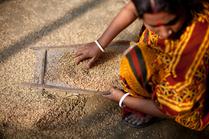 Worldfish Centre, together with its Southern Bangladesh partners (namely Jessore, Barisal and Khulna), organised a two-day workshop to gather development practitioners, government and private sector representatives, and farmers to share information and practices on recognising and enhancing the important role rural women play in fighting poverty and hunger. During the workshop, female farmers were given the chance to speak about their experiences along with partner representatives. The workshop involved two site visits, along with an exhibition showcasing various technologies, interventions and extension materials that are being used to promote and enhance the role of rural women. Husbands of these women farmers also attended the workshop to witness the valuable role their wives play. Worldfish Centre, together with its Southern Bangladesh partners (namely Jessore, Barisal and Khulna), organised a two-day workshop to gather development practitioners, government and private sector representatives, and farmers to share information and practices on recognising and enhancing the important role rural women play in fighting poverty and hunger. During the workshop, female farmers were given the chance to speak about their experiences along with partner representatives. The workshop involved two site visits, along with an exhibition showcasing various technologies, interventions and extension materials that are being used to promote and enhance the role of rural women. Husbands of these women farmers also attended the workshop to witness the valuable role their wives play.
RCSS Participates in Strategic Studies Summit
3–6 November 2012
Regional Centre for Strategic Studies (RCSS)
Bangkok
 RCSS attended the 10th Annual Strategic Studies Network (SSN) Plenary Meeting titled the ‘Strategic Studies Summit: Forward Thinking’ in Bangkok, Thailand from 3–6 November 2012. Around 170 members of the strategic community in the NESA (Near East South Asia) region participated in the meeting representing more than 50 institutes from 20 countries. RCSS attended the 10th Annual Strategic Studies Network (SSN) Plenary Meeting titled the ‘Strategic Studies Summit: Forward Thinking’ in Bangkok, Thailand from 3–6 November 2012. Around 170 members of the strategic community in the NESA (Near East South Asia) region participated in the meeting representing more than 50 institutes from 20 countries.
RCSS was represented by Dr Mallika Joseph, Executive Director; Mr Chaminda Hettiarachchi, Associate Director; Amb. Nihal Rodrigo, Member of the Board of Directors; Ms Aaranya Rajasingam, Programme Officer; and Mr Thiranjala Weerasinghe, Programme Officer. Ambassador Nihal Rodrigo spoke at the plenary session on ‘Governing States and the Society of States’ while Mr Chaminda Hettiarachchi presented a paper on ‘Disaster Management in South Asia’ in a parallel session.
Seminar on ‘Implementing the Responsibility to Protect: Challenges and Opportunities’
2 November 2012
RSIS Centre for Non-Traditional Security (NTS) Studies
Singapore
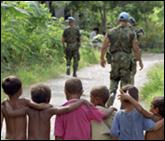 The Responsibility to Protect (RtoP) relates to each state’s responsibility to protect its population from genocide, war crimes, ethnic cleansing and crimes against humanity and their incitement, the international community’s commitment to assist states to that end, and the international community’s responsibility to take timely and decisive action to protect populations from these crimes, when necessary. Referred to by the UN Security Council in relation to situations in Darfur, Libya, Cote d’Ivoire, South Sudan and Yemen, at the fore of diplomatic efforts to stem violence in Kenya, Guinea, and elsewhere and central to ongoing international discussion about Syria, there is no doubt that, to quote the UN Secretary-General, the Responsibility to Protect is a concept whose ‘time has come’. This presentation by Prof. Alex Bellamy, Professor of International Security and Director of the Human Protection Hub at the Griffith Asia Institute, Griffith University, briefly summarised progress thus far since the formal adoption of RtoP in 2005 and provided an overview of some of the critical debates about its implementation and conceptual development. In the final section, the presentation called for the UN to consider developing a strategy for preventing genocide, war crimes, ethnic cleansing and crimes against humanity and outlined the key elements of such a strategy. The Responsibility to Protect (RtoP) relates to each state’s responsibility to protect its population from genocide, war crimes, ethnic cleansing and crimes against humanity and their incitement, the international community’s commitment to assist states to that end, and the international community’s responsibility to take timely and decisive action to protect populations from these crimes, when necessary. Referred to by the UN Security Council in relation to situations in Darfur, Libya, Cote d’Ivoire, South Sudan and Yemen, at the fore of diplomatic efforts to stem violence in Kenya, Guinea, and elsewhere and central to ongoing international discussion about Syria, there is no doubt that, to quote the UN Secretary-General, the Responsibility to Protect is a concept whose ‘time has come’. This presentation by Prof. Alex Bellamy, Professor of International Security and Director of the Human Protection Hub at the Griffith Asia Institute, Griffith University, briefly summarised progress thus far since the formal adoption of RtoP in 2005 and provided an overview of some of the critical debates about its implementation and conceptual development. In the final section, the presentation called for the UN to consider developing a strategy for preventing genocide, war crimes, ethnic cleansing and crimes against humanity and outlined the key elements of such a strategy.
Head of RSIS Centre for Non-Traditional Security (NTS) Studies
in Council on Foreign Relations Meeting on Health Norms
26 October 2012
RSIS Centre for Non-Traditional Security (NTS) Studies
Washington, DC
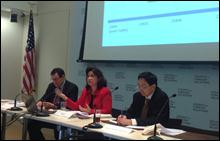 |
| Prof. Caballero-Anthony (middle) delivering her presentation. |
Head of the RSIS Centre for NTS Studies, Prof. Mely Caballero-Anthony, was in Washington, DC, recently to speak in the second meeting of the Global Health Norm Setting Roundtable Series, ‘Establishing Health Norms at the Regional Level: The Cases of Africa and Southeast Asia’.
Focusing on two regions that are prone to public health threats (sub-Saharan Africa and Southeast Asia), this meeting examined the involvement of regional organisations, national governments and networks of civil society organisations in negotiating rules to relay global initiatives and ensure the effective implementation of international health institutions at the national level.
Prof. Caballero-Anthony presented on the issue in relation to Southeast Asia while Amb. Jimmy Kolker, (Principal Deputy Director of Global Affairs, US Department of Health and Human Services, and former ambassador to Burkina Faso and Uganda) spoke about the topic with relation to sub-Saharan Africa.
Head of RSIS Centre for NTS Studies Participates in International IDEA Workshop
23–25 October 2012
RSIS Centre for Non-Traditional Security (NTS) Studies
New York
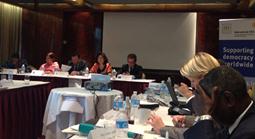 Prof. Mely Caballero-Anthony, Head of the RSIS Centre for NTS Studies, was in New York on 23–25 October to speak in an Inter-Regional Workshop on ‘Regional Organizations and Inclusive Political Participation and Representation’ organised by International IDEA. Prof. Mely Caballero-Anthony, Head of the RSIS Centre for NTS Studies, was in New York on 23–25 October to speak in an Inter-Regional Workshop on ‘Regional Organizations and Inclusive Political Participation and Representation’ organised by International IDEA.
This workshop brought together senior representatives from regional organisations, the UN and experts engaged in political cooperation, gender equality and mainstreaming, and civil society and parliament relations to present regional innovations, exchange experiences and interactively discuss key issues relevant to the promotion of inclusive political participation and representation. Prof. Caballero-Anthony delivered a presentation under the session on ‘Civil Society Engagement’, introducing the experiences and challenges regional organisations face in their engagement with civil society and how such challenges could be addressed.
A record of these workshop proceedings will be presented to the Third Meeting of the Inter-Regional Dialogue on Democracy.
Click here for more information on the event.
Seminar on ‘Peace Process in Southern Philippines: Re-assessing Prospects and Challenges’
19 October 2012
RSIS Centre for Non-Traditional Security (NTS) Studies
Singapore
 In October 2012, the Filipino government reached a peace agreement with the country’s largest Islamic insurgent group, Moro Islamic Liberation Front (MILF), ending the four-decade insurgency in the troubled southern Philippines. The Moro ethnic group has been striving for an independent Muslim country for decades. According to the agreement, an Islamic autonomous region, Bangsamoro, will be established in Mindanao to replace the current Autonomous Region in Muslim Mindanao (ARMM). In October 2012, the Filipino government reached a peace agreement with the country’s largest Islamic insurgent group, Moro Islamic Liberation Front (MILF), ending the four-decade insurgency in the troubled southern Philippines. The Moro ethnic group has been striving for an independent Muslim country for decades. According to the agreement, an Islamic autonomous region, Bangsamoro, will be established in Mindanao to replace the current Autonomous Region in Muslim Mindanao (ARMM).
The long running fight between government forces and the insurgents has caused high civilian casualties and large-scale displacement. In view of serious damages caused by the conflict, the peace agreement was hailed as a landmark event in the efforts to achieve lasting peace in the region. Nevertheless, it should be noted that the agreement is preliminary, with many details yet to be finalised. The negotiations for the deal were long and full of ups and downs. Some foreign governments and non-governmental organisations also played an important role as brokers between the Philippines government and the MILF.
In this seminar, Dr Steven Rood, Country Representative, Philippines and Pacific Island Nations, The Asia Foundation, reviewed highlights of the peace negotiations, the evolution of the situation on the ground, and the role of foreign actors in the process. He also discussed the difficulties in turning the framework deal into a full-fledged agreement and the prospects of peace and development in Mindanao.
RSIS Distinguished Public Lecture on ‘Climate Change: Why We Need a Multilateral Solution?’
18 October 2012
RSIS Centre for Non-Traditional Security (NTS) Studies
Singapore
 In the RSIS Distinguished Public Lecture entitled ‘Climate Change: Why We Need a Multilateral Solution’ organised by the RSIS Centre for NTS Studies, Ms Christiana Figueres, Executive Secretary of the United Nations Framework Convention for Climate Change (UNFCCC), reviewed the status and progress of global climate processes. She emphasised the need to meet the following objectives: (1) close the regulatory gap between the first and the second commitment periods of the Kyoto Protocol; (2) narrow the financial gap to support the developing world between 2012 (which is the end of fast-start finance) and 2020 ($100 billion per year long-term support under the Long-Term Cooperative Action mechanism); and (3) adopt a universally-inclusive and legally-based agreement by 2015 (agreement to start from 2020) to reduce emissions and support developing countries. In the RSIS Distinguished Public Lecture entitled ‘Climate Change: Why We Need a Multilateral Solution’ organised by the RSIS Centre for NTS Studies, Ms Christiana Figueres, Executive Secretary of the United Nations Framework Convention for Climate Change (UNFCCC), reviewed the status and progress of global climate processes. She emphasised the need to meet the following objectives: (1) close the regulatory gap between the first and the second commitment periods of the Kyoto Protocol; (2) narrow the financial gap to support the developing world between 2012 (which is the end of fast-start finance) and 2020 ($100 billion per year long-term support under the Long-Term Cooperative Action mechanism); and (3) adopt a universally-inclusive and legally-based agreement by 2015 (agreement to start from 2020) to reduce emissions and support developing countries.
She then noted the global nature of the climate change problem, the value of every country’s contributions to climate change solutions and the need for a global accounting system to monitor progress as it gives impetus to a multilateral process for climate change. Ms Figueres concluded the lecture with a discussion on the critical role of the private sector in accelerating the massive movement of capital toward clean technologies.
Click here to view her speech.
BIPSS President Speaks on Disaster Risk Reduction and Climate Change in Brussels
16 October 2012
Bangladesh Institute for Peace and Security Studies (BIPSS)
Brussels
 BIPSS President Major-General Muniruzzaman recently spoke at the European Development Day Conference (EDD 12) in Brussels. EDD is considered the flagship event of the EU, a ‘Davos’ in the field of development. Maj-Gen Muniruzzaman spoke at the ‘High Level Panel on Disaster Risk Reduction in the Age of Climate Change’. BIPSS President Major-General Muniruzzaman recently spoke at the European Development Day Conference (EDD 12) in Brussels. EDD is considered the flagship event of the EU, a ‘Davos’ in the field of development. Maj-Gen Muniruzzaman spoke at the ‘High Level Panel on Disaster Risk Reduction in the Age of Climate Change’.
Fellow panelists included Joe Costello, Minister for Trade and Development, Ireland; Manuel Bessler, Head of the Swiss Humanitarian Aid Department; Lakshmi Dhakal, Joint Secretary in the Ministry of Home Affairs, Nepal; Umesh Dhakal, Executive Director, Nepal Red Cross Society; Kristalina Georgieva, European Commissioner for International Cooperation, Humanitarian Aid and Crisis Response; Casimiro Abreu, Deputy Director General, Nacional de Gestao de Calamidades – INGC – Mozambique; and Masato Watanabe, Vice-President, Japan International Cooperation Agency – JICA. The conference was attended by a number of heads of state and governments, ministers, as well as country delegations and experts.
Click here for more information on the event.
CSDS Participates in Workshops in October
October 2012
Centre for the Study of Developing Societies
 Sandeep Shastri of the CSDS Lokniti Programme for Comparative Democracy presented a paper titled ‘Decentralization and Development: The Indian Case Study’ at the International Dialogue on ‘Decentralization: Political, Economic and Administrative Aspects’ organised by the Konrad Adenauer Foundation for Speakers of Myanmar State Legislatures and Leaders of Political Parties at Yangon, Myanmar from 6 to 8 October 2012. He also presented two papers on ‘Citizen Trust in Political Institutions’ and ‘Bureaucracy – Political Leadership Relations’ at the In-service Training Workshop for Bihar Civil Servants organised by the VIT University on 12 October 2012. In addition to these, he was a discussant at a Panel on ‘Role of Provincial and Local Government in Environmental Management’ at the International Conference on ‘Strengthening Green Federalism’ organised by The Tata Energy Resource Initiative along with the Forum of Federations, Ministry of Environment (GOI) and the World Bank on 29 and 30 October 2012. Sandeep Shastri of the CSDS Lokniti Programme for Comparative Democracy presented a paper titled ‘Decentralization and Development: The Indian Case Study’ at the International Dialogue on ‘Decentralization: Political, Economic and Administrative Aspects’ organised by the Konrad Adenauer Foundation for Speakers of Myanmar State Legislatures and Leaders of Political Parties at Yangon, Myanmar from 6 to 8 October 2012. He also presented two papers on ‘Citizen Trust in Political Institutions’ and ‘Bureaucracy – Political Leadership Relations’ at the In-service Training Workshop for Bihar Civil Servants organised by the VIT University on 12 October 2012. In addition to these, he was a discussant at a Panel on ‘Role of Provincial and Local Government in Environmental Management’ at the International Conference on ‘Strengthening Green Federalism’ organised by The Tata Energy Resource Initiative along with the Forum of Federations, Ministry of Environment (GOI) and the World Bank on 29 and 30 October 2012.
^ To the top
Recent Publications
‘Dead or Alive’ in The Responsibility to Protect: From Evasive to Reluctant Action? The Role of Growing Middle Powers
 Alex Bellamy, e-book, Asia Pacific Centre for the Responsibility to Protect (APR2P), pp 11–29, 2012. Alex Bellamy, e-book, Asia Pacific Centre for the Responsibility to Protect (APR2P), pp 11–29, 2012.
This book is the conclusion of a series of activities that started in 2011. Among the activities was a dialogue meeting to debate the many issues surrounding the Responsibility to Protect (RtoP) concept from the perspective of four middle-power countries: Germany, India, Brazil and South Africa (GIBSA). These countries are also aspiring permanent United Nations Security Council (UNSC) members. In this publication, researchers from leading think-tanks in the four GIBSA countries present a variety of viewpoints on RtoP. While the GIBSA countries demonstrate widespread support for RtoP, there is no single overriding position. Many of their official standings mirror the arguments on RtoP in the global discourse. |
|
Foreign Policy: Theories, Actors, Cases
 Steve Smith et al. (eds), Book, Oxford University Press, 2012. Steve Smith et al. (eds), Book, Oxford University Press, 2012.
The ever-changing field of foreign policy is explored first by examining the theoretical and historical perspectives, then the variety of actors, context and goals, and concludes with an interesting range of relevant case studies. In this way, the editors take a balanced approach, presenting the theoretical and practical sides of foreign policy. The expert contributors to the text are a mix of academics and practitioners which supports this balance. Relevant foreign policy issues such as climate change and EU-Russia energy dynamics are explored in the case study section, showing the growing importance of foreign policy in the real world. |
|
ASEAN, the Rohingyas and Myanmar’s Responsibility to Protect
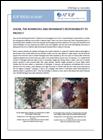 Noel Morada, AP R2P Brief, Vol. 2, No. 9, Asia Pacific Centre for the Responsibility to Protect (APR2P), November 2012. Noel Morada, AP R2P Brief, Vol. 2, No. 9, Asia Pacific Centre for the Responsibility to Protect (APR2P), November 2012.
How can the central government in Myanmar be encouraged to do more in implementing its responsibility to protect the Rohingyas and affected communities in Rakhine state? What is the role of ASEAN and other international actors in preventing further escalation of the crisis between the Rohingyas and ethnic Rakhines? This policy brief identifies some recommendations on how Myanmar and ASEAN could work together with the rest of the international community in dealing with the crisis in Rakhine state following the renewed ethnic violence in the area. |
|
Ownership Restructuring, Marketization and Wealth Inequality in Urban China: 1995 and 2002
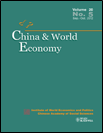 Xiaobin He and Zhuo Huang, China & World Economy, Vol. 20, No. 5, pp 37–62, September–October 2012. Xiaobin He and Zhuo Huang, China & World Economy, Vol. 20, No. 5, pp 37–62, September–October 2012.
This paper proposes a property transformation perspective to examine the mechanisms of wealth accumulation and wealth inequality creation during China’s post-1978 transformation. It examines how enterprise ownership restructuring, marketisation and state politics have resulted in greater wealth inequality between cadres and ordinary workers, between public sectors/organisations and private sectors/organisations. Mainly drawing on data from the Chinese Household Income Project conducted in 1995 and 2002, the paper found that the property transformation process has created greater wealth disparity among different occupational groups and among those working in different work organisations since the mid-1990s. However, it is inconclusive whether non-housing wealth or total household wealth are increasing at the same pace across different occupations and work organisations with the growing market penetration and the spread of privatisation. |
|
Strategic Interaction in Spending on Environmental Protection: Spatial Evidence from Chinese Cities
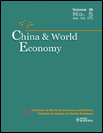 Huihui Deng et al., China & World Economy, Vol. 20, No. 5, pp 103–120, September–October 2012. Huihui Deng et al., China & World Economy, Vol. 20, No. 5, pp 103–120, September–October 2012.
In China, the responsibility of protecting the environment lies largely with local governments. Within the framework of spatial econometrics, we investigate empirically the consequence of such an institutional setting. Using city-level data for China, the present study finds that city governments behave strategically in making spending decisions regarding environmental protection. This paper finds that a city government appears to cut its own spending as a response to the rise in environmental protection spending by its neighbours. Hence, environmental protection tends to be underprovided. As a result, we suggest that centralising the environmental protection responsibility to a higher level of government would be beneficial in terms of controlling pollution in China. |
|
Blue Book on Non-Traditional Security
 Center for Non-Traditional Security and Peaceful Development Studies (NTS-PD), Book, May 2012. Center for Non-Traditional Security and Peaceful Development Studies (NTS-PD), Book, May 2012.
This blue book conducts an annual (2011–12) examination of the latest developments of current non-traditional security issues in China. It analyses issues of public health, food, energy, land and water using a non-traditional security perspective. Each chapter ends with key policy recommendations. |
|
Report on Policy Roundtable on Asian Non-Traditional Security
 RSIS Centre for Non-Traditional Security (NTS) Studies, Report, November 2012. RSIS Centre for Non-Traditional Security (NTS) Studies, Report, November 2012.
The Roundtable was organised by the Chinese Academy of Social Sciences (CASS), the RSIS Centre for NTS Studies and the Center for Non-Traditional Security and Peaceful Development Studies (NTS-PD) at Zhejiang University. This report presents the proceedings of a Policy Roundtable on Asian Non-Traditional Security held in Beijing on 30–31 July 2012. Attended by academics and policymakers from across the region, the Roundtable focused on the following themes: (1) climate change, environmental security and natural disasters; (2) economic crises and human security; (3) energy and human security; and (4) multilevel approaches to human security and conflict management. |
|
Security Sector Governance (SSG) and Conflict Management in Indonesia: The Aceh Case
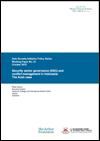 Rizal Sukma, Asia Security Initiative Working Paper, No. 21 Rizal Sukma, Asia Security Initiative Working Paper, No. 21
RSIS Centre for Non-Traditional Security (NTS) Studies, October 2012.
This paper examines the evolution of security sector governance (SSG) in Indonesia, focusing in particular on the effects of security sector reform (SSR) on the management of the secessionist conflicts in the country. It discusses the military’s use of force as an instrument of conflict management in the years immediately following Indonesia’s Independence, arguing that while it is possible to suppress conflicts through military force, such a strategy brings about several problems. The underlying causes of the conflicts may remain unaddressed, and military impunity could increase. These could lead to rising resentment, and eventually escalation of conflicts, as occurred in Indonesia in the late 1990s. This paper argues that to resolve such conflicts, SSR is vital, and it illustrates this through the case of Aceh as an instance of successful resolution of conflict achieved against a backdrop of reform of the military sector. |
|
From Water Insecurity to Niche Water Diplomacy: The Singapore Experience
 Mely Caballero-Anthony and PK Hangzo, NTS Insight, Mely Caballero-Anthony and PK Hangzo, NTS Insight,
RSIS Centre for Non-Traditional Security (NTS) Studies, November 2012.
Singapore’s water diplomacy has long centred on engaging Malaysia, which it has historically relied on for its freshwater supply. Singapore however recognised fairly early on the insecurity inherent in the asymmetrical dependence on Malaysia, with the result that it invested heavily in developing water technologies. This NTS Insight argues that its success in this area has in turn enabled it to develop its particular brand of niche water diplomacy, giving it the wherewithal to exercise considerable influence on international water issues and allowing it to contribute to global water security. |
|
The Green Climate Fund: An Opportunity to Rationalise Climate Finance?
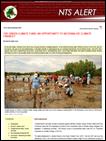 Gianna Gayle Amul, NTS Alert, Gianna Gayle Amul, NTS Alert,
RSIS Centre for Non-Traditional Security (NTS) Studies, November 2012.
Is the new Green Climate Fund (GCF) set to be yet another unwieldy addition to the climate finance web? While the form of the GCF, and its functions, have yet to be fully determined, the GCF has been framed in negotiations as an umbrella mechanism for all climate funds. This NTS Alert argues that, as an overarching instrument, its promise lies in the possibility that it could help rationalise the overly complex climate finance architecture, and in the process tackle the critical problems seen in current funding arrangements. |
|
Transboundary Haze in Southeast Asia: Challenges and Pathways Forward
 J. Jackson Ewing and Elizabeth McRae, NTS Alert, J. Jackson Ewing and Elizabeth McRae, NTS Alert,
RSIS Centre for Non-Traditional Security (NTS) Studies, October 2012.
Transboundary haze has had wide-ranging impacts in Southeast Asia, on public health, tourism, biodiversity and national economies. In tackling this problem, important questions exist about the trajectory of haze trends in the context of a changing climate and of shifting conditions on the ground in Indonesia. This NTS Alert reviews leading knowledge on these points, and explores pathways for tackling the haze issue in the face of the seeming ineffectiveness of ASEAN-level mechanisms. |
|
Traditional Security as a Source of Non-traditional Insecurities – The Case of Okinawa
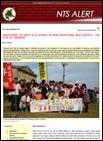 Lina Gong, NTS Alert, Lina Gong, NTS Alert,
RSIS Centre for Non-Traditional Security (NTS) Studies, September 2012.
Tensions over the US military bases in Okinawa are rooted in the conception of the state as the only referent of security, with national security being defined in military terms. Under this traditional view of security, human security threats arising from the presence of the bases were largely ignored, with the result that anger simmered among the local population, finally breaking out in the 1990s. This NTS Alert argues that the case of Okinawa illustrates the importance of moving away from viewing traditional security and non-traditional security as being mutually exclusive. Instead, the two should be regarded as mutually reinforcing; with traditional security laying the foundations for human security; and attention to non-traditional security issues perhaps allowing the population to understand and accommodate to the country's traditional security needs. |
|
Gender Democracy, Peace Building, Conflict Transformation
 Manjrika Sewak, Conference Report, WISCOMP 2012 Manjrika Sewak, Conference Report, WISCOMP 2012
The Conflict Transformation Programme of WISCOMP comprises a series of workshops which facilitate dialogue between young people from across conflict divides in South Asia. This report documents the discussions and activities that took place during the 9th Annual Conflict Transformation Workshop in 2011. |
|
Countering Militarization, Building Peace: The Intersectionality of SCR 1325 and the Responsibility to Protect
Anuradha M. Chenoy, Monograph, WISCOMP, 2012.
The series, Revisioning and EnGendering Security Gender and Non Traditional Aspects of Security, in South Asia, aims to contribute to a corpus of knowledge around the manner in which gender and non-traditional security concerns intersect in South Asia. This monograph looks specifically at the challenges that UNSCR 1325 and the Responsibility to Protect (RtoP) encounter in the region. |
|
WorldFish Annual Report 2011/2012
 WorldFish Center, November 2012. WorldFish Center, November 2012.
This year’s report contains the Director General’s and Chairman’s statements. Also highlighted in the reports are stories of projects with different partners. These include the following:
1) CGIAR Research Programme on Aquatic Agricultural Systems (AAS) in Zambia.
2) Wetland Alliance project in the Mekong delta.
3) Projects with CARE, the humanitarian organisation in Egypt.
4) Tilapia breeding programme with Water Research Institute (WRI) in Ghana.
5) Partnerships with the private sector on sustainable aquaculture enterprise in developing countries. |
|
Transforming Aquatic Agricultural Systems towards Gender Equality: A Five Country Review
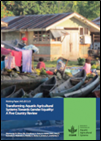 N. Weeratunge et al., Report, WorldFish Center, November 2012. N. Weeratunge et al., Report, WorldFish Center, November 2012.
Aquatic agricultural systems (AAS) are systems in which the annual production dynamics of freshwater and/or coastal ecosystems contribute significantly to total household income. Improving the livelihood security and well-being of the estimated 250 million poor people dependent on AAS in Bangladesh, Cambodia, the Philippines, the Solomon Islands and Zambia is the goal of the Worldfish Center-led Consortium Research Program (CRP). This paper provides an initial input into developing this knowledge, based on a review of literature on agriculture, aquaculture and gender relations within the five focal countries. Before delving into the findings of the literature review, the paper first justifies the expectation that successfully achieving lasting well-being improvements for poor women and men dependent on AAS rests in part on advances in gender equity, and in light of this justification, presents the AAS CRP’s conceptual framework for gender and social analysis. |
|
Towards Sustainable Development of Small-scale Fisheries in the Philippines: Experience and Lessons Learned from Eight Regional Sites
 M.L. Perez et al., Brief, WorldFish Center, October 2012. M.L. Perez et al., Brief, WorldFish Center, October 2012.
The focus of this paper is on the governance of small-scale or municipal fisheries in the Philippines in light of the critical role they play in the livelihoods of coastal communities and in the nation as a whole. The information and insights presented in this lessons-learned brief derive from the project entitled ‘Strengthening Governance and Sustainability of Small-Scale Fisheries Management in the Philippines: An Ecosystem Approach’. The project was funded principally by the Department of Agriculture’s Bureau of Agricultural Research (DA-BAR), and implemented from 2008 to 2011 by WorldFish in collaboration with the Department of Science and Technology (DOST) and selected partners. |
|
Evaluating the Management Effectiveness of Three Marine Protected Areas in the Calamianes Islands, Palawan Province, Philippines
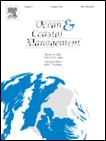 Len R. Garces et al., Paper, WorldFish Center, July 2012. Len R. Garces et al., Paper, WorldFish Center, July 2012.
Evaluating the management effectiveness of marine protected areas (MPAs) has been a continuing challenge in marine conservation in the tropics. This paper describes the process involved, the chosen indicators and the selected results of the evaluation of management effectiveness of three MPAs in the Calamianes Islands, Palawan Province, Philippines. The evaluation was a participatory process that involved several institutions: academe, an externally-funded project, local governments, national government agencies and research organisations. Key lessons learned indicate the need to correlate the perceptions of coastal stakeholders with scientific findings as some perceptions did not reflect the results of biophysical surveys. The paper illustrates that a multidisciplinary approach and engagement of key stakeholders provides a comprehensive assessment and consensus for measuring the success of MPAs. |
^ To the top
Commentaries and News Articles
In Conversation with Jonathan Bloom (Editor, Wastedfood.com)
In Conversation with Julian Parfitt (Principal Resource Analyst, Oakdene Hollins)
In Conversation with Nerlita Manalili (Managing Director, NEXUS Agribusiness Solutions)
Interviews conducted on the sidelines of an Expert Working Group Meeting on Food Wastage in Southeast Asia on 23–24 August 2012.
RSIS Centre for NTS Studies, Uploaded in November 2012.
Social Transformation to End Gender Inequalities
WorldFish Center, New Agriculturalist, 9 November 2012.
Can We Afford to Adapt? The Case of Aquaculture in Vietnam
Caity Peterson, WorldFish Center Blog, 6 November 2012.
ASEAN Human Rights Declaration: A Pragmatic Compromise
Joel Ng, RSIS Commentaries, No. 211, 21 November 2012.
Food Security: Gut Issue in Asia, Pacific
Ed Javier, BusinessMirror, 17 November 2012.
Chinese Role Critical to Keeping World from Brink of Hunger
Liu Rui, Global Times, 8 November 2012.
Plight of the Rohingya: ASEAN Credibility Again at Stake
Yang Razali Kassim, RSIS Commentaries, No. 207, 6 November 2012.
The Bangsamoro Framework Agreement: Implications for ASEAN
Ava Patricia C. Avila, RSIS Commentaries, No. 195, 19 October 2012.
The 2012 Bangsamoro Framework Agreement: Lessons Learned?
Joseph Franco, RSIS Commentaries, No. 189, 9 October 2012.
Reducing Indonesia’s Health Risks: Filtering a Smoke-Free ASEAN?
Gianna Gayle Amul, RSIS Commentaries, No. 175, 17 September 2012.
Creating Ripples with Water Diplomacy
Pau Khan Khup Hangzo, Today, 27 September 2012.
Still Falling Short, In Preparing for Disaster
Gianna Gayle Amul, Today, 21 September 2012.
Hidden Hunger
Sally Trethewie, Anza Magazine, August 2012.
Experts Warn of Future Asia-Pacific Food Vulnerability
Paul Teng, Voice of America, 3 August 2012.
Food Security: Cities as Part of the Solution and Not the Problem
Paul Teng, RSIS Commentaries, No. 142, 3 August 2012.
A New Political Entity in Mindanao? Challenges of Election-related Dysfunction and Violence
Joseph Franco, RSIS Commentaries, No. 133, 23 July 2012.
Western Myanmar Unrest: Partisan Portrayals Risk Extremist Implications
Kyaw San Wai, RSIS Commentaries, No. 131, 18 July 2012.
Involving Indonesia in the Philippine Peace Process: Clearing Away ‘Inclement Weather’?
Joseph Franco, RSIS Commentaries, No. 119, 9 July 2012.
The ASEAN Human Rights Declaration: Establishing a Common Framework
Joel Ng, RSIS Commentaries, No. 114, 3 July 2012.
Myanmar: Learning from the Philippines’ Democratic Transition
Julius Cesar I. Trajano, RSIS Commentaries, No. 111, 27 June 2012.
^ To the top
|